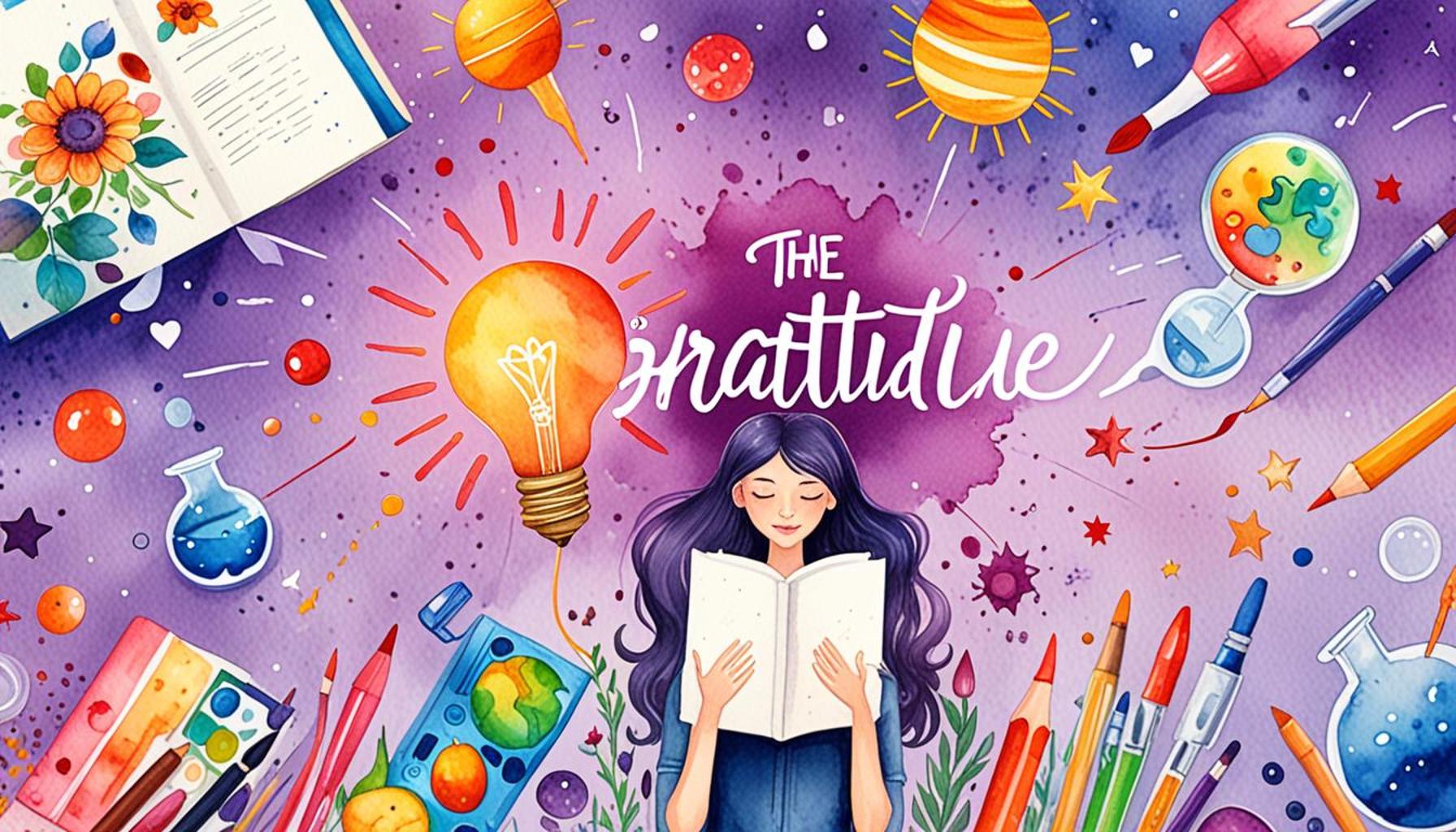The Science Behind Gratitude: Studies Proving Its Emotional Benefits

The Essence of Gratitude in Everyday Life
Gratitude is not merely a fleeting feeling; it represents a deeper, enduring state of appreciation that can significantly alter our emotional well-being. Numerous studies highlight its transformative power, suggesting that cultivating this attitude can yield impressive results for both mental health and interpersonal relationships. Understanding the implications of gratitude is vital in today’s fast-paced world, and its relevance can be seen strongly in contexts like Nigeria, where community, respect, and shared values thrive.
Emotional Benefits Supported by Research
Research indicates clear, measurable benefits associated with the practice of gratitude:
- Improved Mental Health: Studies suggest that individuals who regularly express gratitude experience a decline in symptoms related to depression and anxiety. For example, a study published in the *Journal of Personality and Social Psychology* found that participants who wrote about things they were grateful for each week reported fewer health complaints and better moods.
- Enhanced Relationships: Expressing gratitude is key to building and maintaining strong connections. In the context of Nigerian culture, where communal living is prevalent, acknowledging others for their support or kindness can deepen bonds between family, friends, and colleagues. A simple “thank you” can initiate a positive cycle of mutual appreciation and trust.
- Increased Resilience: Those who regularly practice gratitude tend to show greater resilience when facing life’s inevitable hurdles. This resilience is critical in Nigeria, where many navigate economic and social challenges. By focusing on what is good, individuals can cultivate a buffer against stress and adversity.
Integrating Gratitude into Daily Life
Incorporating gratitude into daily routines can be as simple as reflecting on small acts of kindness. Consider thanking a neighbor for their help with carrying groceries or recognizing the beauty of Nigeria’s vibrant landscapes, such as the lush greenery of the Niger Delta or the stunning sunsets that illuminate the Sahara. Such practices not only enhance personal well-being but also enrich community life.
Current neuroscience research reveals fascinating insights into how the brain reacts to gratitude. The act of being grateful triggers the release of dopamine and serotonin, neurotransmitters that contribute to feelings of happiness. This biological response underscores the idea that gratitude not only boosts emotional health but also enhances our relationships by promoting empathy and perspective-taking.
As you delve into the world of gratitude, you’ll uncover a wealth of evidence supporting these emotional benefits. You’ll find that cultivating gratitude can dramatically improve your quality of life. Consider keeping a gratitude journal where you note down things you appreciate on a daily basis. Over time, this practice can reinforce a grateful mindset, encouraging you to notice the positive aspects of your surroundings, empowering you to lead a more fulfilled life.

ADDITIONAL INSIGHTS: Expand your understanding here
Unlocking the Emotional Power of Gratitude
As science delves deeper into the emotional complexities of gratitude, it becomes clear that this simple act of recognition fosters significant psychological benefits. Studies show that gratitude not only enhances individual happiness but also promotes a sense of unity within communities—an element deeply valued in Nigerian society. Understanding the mechanics behind gratitude can empower individuals to embrace practices that support mental health and strengthen relationships.
Scientific Insights into Gratitude
Numerous scientific investigations have painted a compelling picture of gratitude as a catalyst for emotional wellness. Among these findings, several key areas stand out:
- Boosting Happiness: Research from the University of California suggests that individuals who engage in regular gratitude practices experience a substantial increase in overall happiness. This enhancement often stems from a shift in focus—from what one lacks to what one has, thereby fostering a positive mindset amidst life’s challenges.
- Reducing Negative Emotions: A study published in the *Journal of Research in Personality* indicated that practicing gratitude reduces feelings of envy, resentment, and frustration. In many parts of Nigeria, where competition in various sectors can foster negativity, gratitude serves as an antidote, enabling individuals to appreciate their journeys rather than compare themselves to others.
- Physical Health Benefits: A fascinating link exists between gratitude and physical well-being. According to research published in *Health Psychology*, those who maintain a gratitude journal reported fewer physical ailments and engaged in healthier behaviors. This correlation amplifies the importance of focusing on the positive aspects of life for improved health outcomes.
Moreover, the emotional benefits linked to gratitude extend beyond individual advantages. In the context of Nigeria’s rich cultural tapestry, gratitude plays a vital role in reinforcing social cohesion. When community members express appreciation for one another, relationships flourish, leading to a nurturing environment that supports collective well-being.
The Transformative Power of Sharing Gratitude
Additionally, sharing gratitude with others is proven to deepen connections. A simple acknowledgment of someone’s efforts can create ripples of goodwill. Whether it’s a heartfelt thank you to a family member for their support during tough times or expressing admiration for a friend’s achievements, these gestures foster an atmosphere of mutual respect and appreciation. Such behaviors are especially salient in Nigerian culture, where communal values underscore the importance of connectivity and support.
As we navigate through the complexities of modern life, particularly amidst socio-economic challenges, nurturing gratitude can become a powerful tool for enhancing emotional resilience and well-being. Exploring the science behind gratitude equips individuals with strategies to embrace a more fulfilling, healthier existence. As you ponder these insights, consider the role gratitude plays in your daily life and how it can serve as a foundation for enriching your emotional landscape.
The Emotional Benefits of Practicing Gratitude
In recent years, numerous studies have illuminated the profound emotional benefits of practicing gratitude. Researchers have found that regularly acknowledging and appreciating what we have can lead to significant improvements in our mental well-being. One pivotal study published in the journal *Personality and Individual Differences* revealed that individuals who kept a gratitude journal reported higher levels of positive emotions, increased life satisfaction, and lower rates of depression.
Gratitude has a unique way of shifting our focus from what we lack to what we appreciate, fostering a positive mindset. This cognitive shift plays a crucial role in emotional regulation. When we actively reflect on our blessings—whether they are relationships, experiences, or even simple pleasures—we cultivate a mental environment less susceptible to negative thoughts.
Moreover, gratitude promotes resilience. According to research published in *Psychology Today*, individuals who express gratitude regularly are better equipped to cope with stress and adversity. This resilience is attributed to the positive feelings linked to gratitude, which can act as a buffer against life’s challenges.
Additionally, cultivating gratitude can enhance our social relationships. Studies show that expressing thanks can deepen connections and increase feelings of empathy. This is because gratitude fosters an atmosphere of trust and appreciation, which encourages positive social interactions. Consequently, relationships that are rooted in gratitude tend to be more satisfying and supportive.
Furthermore, gratitude impacts our overall emotional health. A study conducted by researchers at the University of California found that those who practiced gratitude reported better sleep quality and healthier lifestyles. Gratitude encourages individuals to prioritize their well-being, leading to healthier choices and a more balanced life.
As we delve deeper into the science of gratitude, it becomes increasingly clear that its emotional benefits extend far beyond a simple ‘thank you.’ From enhancing mental wellness to strengthening social bonds, gratitude emerges as a powerful tool for fostering a fulfilling and emotionally rich life.
| Category | Advantages |
|---|---|
| Increased Positive Emotions | Regular gratitude practice boosts happiness and life satisfaction. |
| Enhanced Relationships | Expressing gratitude strengthens bonds and fosters trust. |
| Greater Resilience | Increases the ability to cope with stress and bounce back from adversity. |
| Improved Mental Health | Leads to lower levels of depression and anxiety. |
CHECK OUT: Click here to explore more
The Neurological Benefits of Gratitude
In addition to the psychological advantages of gratitude, recent studies have uncovered fascinating neurological underpinnings that highlight how gratitude affects brain function. Neuroimaging research conducted by neuroscientists at the University of California, Berkeley, reveals that expressing gratitude activates specific brain regions associated with emotional regulation and social bonding. Among these are the prefrontal cortex and the ventral anterior cingulate cortex, which play key roles in emotions, decision-making, and social interactions. Understanding these effects can encourage more individuals in Nigeria to incorporate gratitude practices into their lives.
Gratitude and the Brain
Functional Magnetic Resonance Imaging (fMRI) studies have shown that when individuals reflect on what they are grateful for, their brain releases dopamine—the neurotransmitter commonly associated with pleasure and reward. This explains why gratitude not only feels good but can also become addictive in a positive way. When we practice gratitude, we are essentially training our brains to seek out the good in our experiences, leading to a habitual positive mindset.
Furthermore, a study published in the *Journal of Positive Psychology* found that gratitude practices can lead to less reactivity in the amygdala, the part of the brain that processes fear and stress. By reducing this reactivity, individuals can better handle adversity, making gratitude particularly valuable in high-stress environments, such as those many Nigerians face in everyday life.
The Ripple Effect of Gratitude
One cannot overlook the broader implications of gratitude within social networks. Research indicates that gratitude has a contagious effect, spreading beyond the individual who expresses it. This phenomenon, described as the “ripple effect,” posits that expressing appreciation can inspire others to pay it forward. For example, a study published in the *Psychological Science* journal illustrated how when participants received a gratitude letter, they exhibited a chain of kindness towards others. In Nigeria, where community bonds are vital, fostering an environment of gratitude can promote a stronger sense of belonging and deeper relationships among neighbors and friends.
Moreover, gratitude can serve as a critical buffer in times of strife. During challenging periods such as economic downturns or social unrest, demonstrating gratitude can reinforce a sense of hope and resilience. Surveys conducted across various Nigerian communities have pointed to a direct correlation between gratitude expression and collective coping mechanisms in difficult times. By cultivating an attitude of thankfulness, individuals can uplift not only their spirits but also those of those around them, creating a supportive atmosphere that can ease tension and foster collaboration.
Practical Strategies for Cultivating Gratitude
As awareness of gratitude’s benefits expands, so do the practical strategies for fostering it. Many wellness experts recommend keeping a gratitude journal where individuals jot down three things they are thankful for each day. This simple yet impactful practice can shift one’s focus and enhance emotional well-being over time. In Nigeria, community-driven initiatives that encourage group gratitude sharing can further amplify these benefits, creating a network of appreciation that unites people in common causes.
Incorporating gratitude into daily interactions, such as expressing appreciation for service workers or acknowledging family members, can also lead to enhanced positive feelings among individuals and within communities. As more people recognize the emotional and neurological benefits of gratitude, it is likely that these practices will proliferate, weaving gratitude into the fabric of social life, thereby enriching the communal experience.
RECOMMENDED: Check out this similar article
Conclusion: Embracing Gratitude for a Healthier Tomorrow
The exploration of gratitude reveals a rich tapestry of emotional and neurological benefits that can profoundly impact our daily lives. As outlined through various studies, the practice of gratitude not only elevates our mood and resilience but also fosters healthier connections within our communities. When individuals take the time to express appreciation, they stimulate brain pathways associated with joy and social bonding, creating a more supportive environment.
Moreover, the ripple effect of gratitude extends beyond personal well-being, influencing collective emotional health. In Nigeria, where communal ties are essential, practicing gratitude can lead to stronger relationships, greater cooperation, and a sense of belonging. The correlation between gratitude and improved emotional regulation highlights its importance, especially during challenging times faced by many individuals and communities.
As we look ahead, the question remains: how can we actively incorporate gratitude into everyday life? By implementing simple yet effective practices such as gratitude journaling or participating in community initiatives that promote thankfulness, we can cultivate a culture that embraces appreciation. This not only enhances our mental well-being but also contributes to a harmonious societal landscape.
Ultimately, the science behind gratitude is a call to action—a reminder that the choice to be thankful can reshape our emotional experiences and strengthen our communal bonds. By committing to this practice, individuals can unlock its transformative power, leading to a brighter future enhanced by gratitude.


